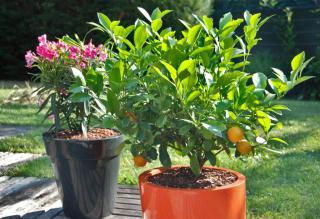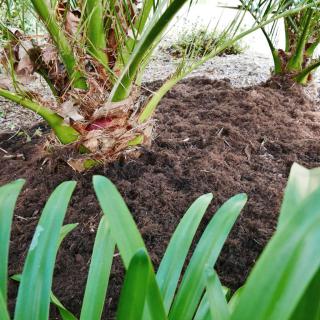

Mulch is anything purposefully layered on soil to protect plants, nourish them, and decorate your garden.
Usually made with natural products, mulching is very beneficial to plants and landscaping. In addition, it helps deal with that most tedious garden chore: weeding!
More than just a decorative ornament, mulch is totally nature-friendly – and wallet-friendly!
Read also:
Mulch reproduces nature’s way of working: soil should never stay bare. Always keep those vegetable and flower beds covered!
Mulch is one of today’s most trendy products, and it isn’t only because it looks great!
Thanks to the thick opaque layer that mulch forms on the soil surface, it prohibits weed seed germination and thus indirectly avoids the use of herbicides – all of which are chemical-based.
A layer barely 1 to 2 inches (3 to 4 cm) thick is enough to protect roots from freezing, especially for potted plants.
It will keep the root system in top form to burst with life in spring.
As they slowly break down, they will enrich the soil with important nutrients that will boost your plantation’s development.

Here are a few possibilities: shale mulch, pozzolana mulch (shown in these pots), pebbles or clay marbles
This includes all types of mulch derived from plants. Abundant and renewable, these mulches always make the soil richer and plant-friendly as time passes. It must be renewed yearly or every two years, since it naturally breaks down with time. It provides nutrients and reduces the need for fertilizer.
A few stylish favorites that are both surprising and plant-friendly: pine tree bark mulch, cocoa hull mulch, flax mulch, dried leaf mulch, lawn trimmings…
Although not mulch in the actual sense, green manure is one way to perform the same functions as mulch, but only for a season.
Among the most nutritious plant-based mulches is wood chip mulch, and more specifically ramial wood chips.
Each type of mulch has specific advantages. Mineral mulch excels at keeping weeds away. Plant-based mulch releases nutrients as it breaks down.
Quantities differ for each as well. For example, mineral mulch will usually require only 1 to 2 inches (3 to 5 cm) of mulch to be effective, whereas for plant-based mulch, the more the merrier! It’s even possible to stack up to a foot (30 cm) of plant material if you’re starting a growing bed in poor soil!
You’ll have understood by now that mulching boasts many advantages, and is among those products that can easily replace others that don’t necessarily respect our planet.
Since mulch creates a favorable environment within the ecosystem, such animals as worms, larvae, and insects will be attracted to it.
Birds will then come to feed on those.
Mulching thus enriches your garden’s ecosystem, and gives our bird friends a great nutritious pantry, especially in winter.

Among these mulch-rejecting plants are Mediterranean-native plants, that can benefit from some mulch during summer, but only a thin layer. Succulents or rock plants, need dry soil, sometimes even arid.
If you only have small batches of mulch material, you can pack it around a few plants and create a patchwork in your garden beds!
I love how you added how mulch benefits the ecosystem – birds benefit from them. In our company, we take mulching seriously. We believe that mulching can greatly improve the health of trees and plants. Your post just confirms mulching is the best. 🙂